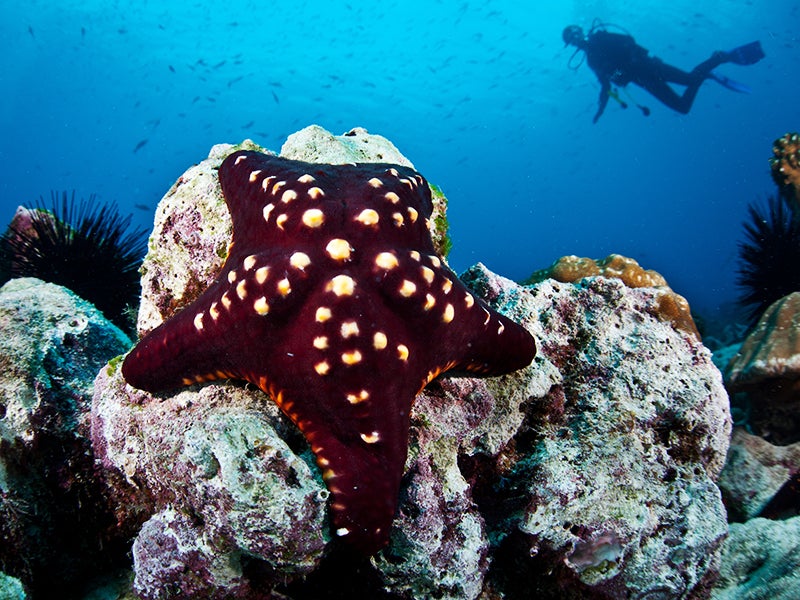Coral Reefs and the Unintended Impact of Tourism
The choices we make as tourists can affect the health of Costa Rica’s renowned coral reefs.

This page was published 9 years ago. Find the latest on Earthjustice’s work.
One day, during my internship in Costa Rica with the Interamerican Association for Environmental Defense (AIDA), I met up with a friend of mine who was visiting from the U.S. She told me about her trips to the gorgeous local beaches. Everything she described sounded beautiful: the clear blue water, hermit crabs that left their shells to eat breakfast in the early morning hours, sweet fruits that fell onto the smooth sand and the lush trees that offered shade from the hot Costa Rican sun.
But her mood changed suddenly from bliss to concern when she told me about how her co-worker swam too close to a coral reef one afternoon and badly cut his thigh. She was concerned by how unprepared their tour guide was to handle the medical situation, and by how irresponsible it seemed that tourists with no diving experience were allowed to swim so close to the reef.
In addition to the physical danger to humans, accidents like these can have a severe impact on sensitive marine ecosystems like coral reefs. Coral reefs are unique and complex systems, vital to the health of the world’s oceans. But 93 percent of the reefs in Costa Rica are in danger, and tourism is a significant factor in their degradation.
How Tourism Threatens Corals
When tourists accidently touch, pollute or break off parts of the reef, corals experience stress. The coral organisms try to fight off the intrusion, but this process often leads to coral bleaching — when corals expel the brightly colored algae that live in them and become completely white. Once corals are bleached, they die and can no longer contribute to the biodiversity of the reef community. And since the disruption of one ocean system impacts all the others, sea grass and mangroves — shallow-water plant species vital to the health of the marine ecosystem — are also threatened by coral stress.
Another significant problem facing coral reefs is sedimentation. When dirt and debris are deposited into the ocean, they pollute marine ecosystems and block the sunlight algae need for photosynthesis. When light is blocked, the immobile coral reefs bleach and die.
In Costa Rica, sources of sedimentation include dredging, logging, agriculture and coastal development driven by the tourism industry. A study by biologist Jorge Cortés documents a decade of negative impacts from tourism on coral reefs in the Cauhita region of Costa Rica. Sedimentation will continue to devastate Pacific reefs if better management principles are not enacted.
Scientists predict that 50 percent of all coral reefs in Latin America are at risk of degradation in the next five to 10 years. Studies show that globally, 30 percent of coral reefs are already seriously damaged. Seventy percent of all reefs are expected to disappear by 2030 if we don’t take corrective action to stop the negative human impacts of climate change on coral reef communities.
Rebuilding a Future for Coral Reefs
Sustainable tourism is a great concept on paper, but hard to enforce in reality. Construction of coastal properties requires dredging. It creates polluted runoff from roads and parking lots and airports. Sewage is dumped into the ocean, and more intensive agriculture to support all the new people increases sedimentation.
Although it’s difficult for an individual to stop massive projects like these, it’s easy to take small but powerful steps in the right direction. Don’t touch living coral and don’t pick up wildlife for souvenirs, including shells, coral rubble and plants. Be conscious of what you bring with you, for example reusable water bottles instead of plastic bottles and a backpack for your trash in case there isn’t an area nearby to dispose of waste properly. Take the bus instead of a car, and if possible, do your research on the hotels or hostels where you stay. Many coastal hotels dump their graywater — wastewater from laundry, cooking and household sinks — into the ocean, contributing to sedimentation and the contamination of coral reefs.
It’s important to be aware of the fact that many land-based activities may directly harm the marine ecosystem. Being an environmentally friendly tourist is not about being perfect, but individual actions, though they may seem small, really can make a big impact.
AIDA provides much-needed recommendations for effective laws and practices to preserve and protect coral reefs in Latin America.
Earthjustice is a founding partner of AIDA, an organization that uses the law to protect the right to a healthy environment in the Americas, with a focus on Latin America. AIDA has documented International Regulatory Best Practices for Coral Reef Protection and is advocating for Costa Rica and Mexico, in particular, to strengthen protections for coral reefs.
The International Program partners with organizations and communities around the world to establish, strengthen, and enforce national and international legal protections for the environment and public health.